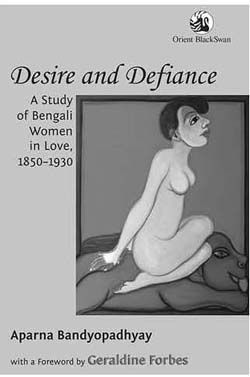Aparna Bandopadhay’s book creates a narrative out of the heartrending journey of desire and defiance that women in colonial Bengal went through for daring to assert the aspirations of their hearts. Caught between a patriarchal society and a patriarchal state, it shows in detail how classic patriarchy excludes and punishes women who challenge its control over their sexuality. The chapter ‘Quest for Legitimacy’ recounts the instances when women from kulin Hindu and Brahmo families asserted their right to choose their life partners. The Hindu ideal of marriage was a non-consensual marriage at a pre-pubertal age. Although the Brahmos accepted the concept of mutual consent, they too imposed restrictions of caste endogamy, Brahmo endogamy, regional endogamy, and obtaining the approval of the families. Any choice that did not meet with these criteria was considered transgressive. Young kulin women, haunted by the spectre of lifelong spinsterhood or marriage to a polygamous older man and subsequent early widowhood, married men who were not vetted by their families. Such acts of daring by the kulin women obliterated all contact with their natal families. Brahmo couples, on the other hand, sought legitimacy for their relationship. However, marrying by declaring non-affiliation to any religion (Special Marriage Act of 1872), marrying across regions and even across religious lines were transgressions that met with resistance to granting legitimacy. Marriage became a public issue and the decision of legitimacy was made by the larger society and not just the family.

Patriarchy And Forbidden Love
Nilanjana Ray
Desire and Defiance a Study of Bengali Women in Love, 1850-1930 by By Aparna Bandopadhyay Orient BlackSwan, Hyderabad, 2016, 303 pp., 1095.00
August 2016, volume 40, No 8
